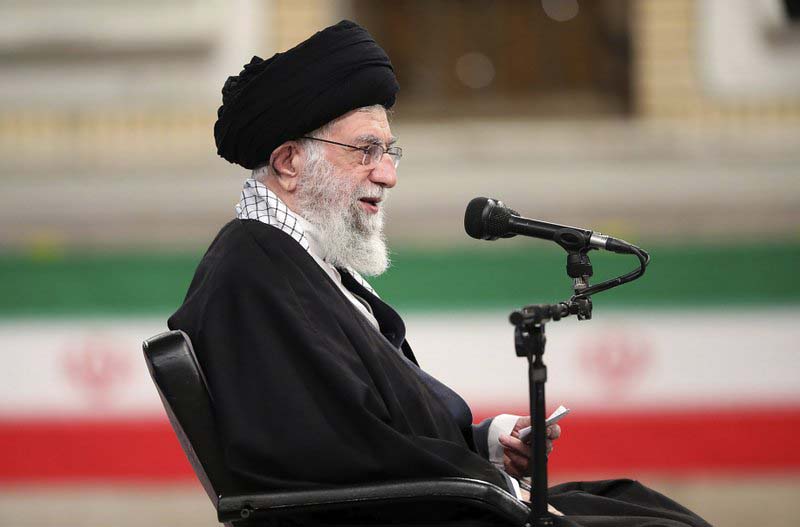

Iran’s intelligence minister warned the West that his country could push for a nuclear weapon if crippling international sanctions on Tehran remain in place, state television reported on Tuesday.
The remarks by Mahmoud Alavi mark a rare occasion that a government official says Iran could reverse its course on the nuclear program. Tehran has long insisted that the program is for peaceful purposes only, such as power generation and medical research.
A 1990s fatwa, or religious edict, by the country’s Supreme Leader Ayatollah Ali Khamenei states that nuclear weapons are forbidden.
“Our nuclear program is peaceful and the fatwa by the supreme leader has forbidden nuclear weapons, but if they push Iran in that direction, then it wouldn’t be Iran’s fault but those who pushed it,” Alavi was quoted as saying.
“If a cat is cornered, it may show a kind of behavior that a free cat would not,” he said and added that Iran has no plans to move toward a nuclear weapon under current circumstances.
Israel has long accused Iran of trying to develop nuclear weapons, and the 2015 nuclear accord between Iran and world powers put strict limits on Iranian nuclear activities to prevent it from reaching weapons capabilities. In exchange, Iran was given sanctions relief.
Then-President Donald Trump withdrew from the deal in 2018, prompting Iran to resume some of its nuclear activities. The new Biden administration has signalled it would like to revive the deal, raising concerns in Israel.
The Israeli military estimates that Iran is still two years away from reaching the capability of producing a bomb. But in a briefing with reporters, a senior military official said the army believes Iran has made ‘significant progress’ in collecting fissile material and research and development. He said the army is especially concerned about ‘irreversible’ progress, such as the knowledge it has gained from using sophisticated centrifuges. The official spoke on condition of anonymity because he was discussing an intelligence assessment.
The 81-year-old Khamenei, who has the final say on all matters of state in Iran, on Sunday urged the United States to lift all sanctions if it wants Iran to live up to commitments under its 2015 nuclear deal. However, President Joe Biden has said the US won’t be making the first move.
Iran President Hassan Rouhani in comments aired on state TV on Tuesday reiterated the US must first take steps to honour nuclear deal agreements. “Any day that the US resumes implementing its commitments under the nuclear deal, we will fully implement our promises under the deal as well,” he said.
Following the killing last December of an Iranian scientist credited with spearheading the country’s disbanded military nuclear program, Iran’s parliament has approved a law to block international nuclear inspectors later this month — a serious violation of the accord.
Alavi, the intelligence minister, was also quoted as saying that a member of the Iranian armed forces ‘facilitated’ the killing of the scientist, which Iran has blamed on Israel.
The minister did not expand on what he meant — and it was not clear if the soldier had carried out the explosion that killed the scientist, Mohsen Fakhrizadeh. Israel, which has been suspected of killing Iranian nuclear scientists over the last decade, has repeatedly declined to comment on the attack.
This was the first time that Iran acknowledged a member of its armed forces may have acted as an accomplice in the killing of Fakhrizadeh, who headed Iran’s so-called AMAD program, which Israel and the West have alleged was a military operation looking at the feasibility of building a nuclear weapon.
The International Atomic Energy Agency — the UN’s nuclear watchdog — says that ‘structured programme ended in 2003. US intelligence agencies concurred with that assessment in a 2007 report.
In December, Rouhani vowed to avenge Fakhrizadeh’s killing, saying his country will decide time or venue of any retaliatory action.
In response to Trump’s so-called ‘maximum pressure’ campaign against Iran, the country began to gradually violate its atomic commitments under the nuclear deal. It also threatened further provocations in a bid to increase its leverage and get Biden to prioritise a return to the deal as he moves to dismantle Trump’s legacy.
As part of those steps, Iran has begun enriching uranium closer to weapons-grade levels and said it would experiment with uranium metals, a key component of a nuclear warhead. Iran insists that all breaches of the pact are easily reversible.
Source: RSS/AP